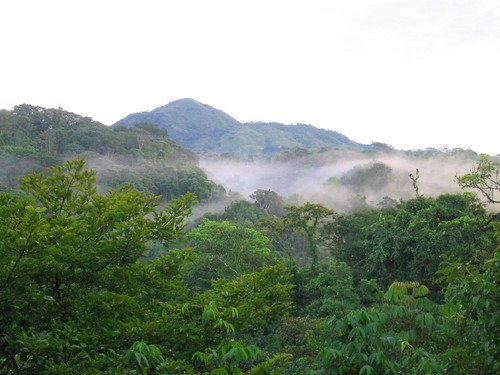
One fascinating thing about Costa Rica is its governments different priorities and how that effects peoples lives of the Ticas. In the history of Latin America most governments down here seem to constantly cycle from a weak but elected, to a strong military coup, a revolution, back to another weak elected government... etc. In 1947, however, Costa Rica broke out of that cycle by thinking out of the box; they simply got rid of their military.
Imagine what a country could do if it suddenly had the windfall of not needing to fund a vast and expensive military. For point of reference, the US spent about $437 Billion on our military in 2004, so if we divide that by 300 million people we are each spending the equivelent of about $1500 a year. Call me a peacenik hippy geek if you must, but I'd rather that US bought every single American young and old Apple powerbook every year instead.

Unfortunately Costa Rica has different spending priorities than I do. Instead of spending their money on shiny electronics they wasted it all on nationalized healthcare and preserving spectacularly beautiful national parks.

And, it worked. In 2000 the World Health Organization ranked 191 countries for the quality of the healthcare system. Costa Rica ranked 36, ahead of the US who came in at number 37. And, despite what ideologues try to suggest, nationalized healthcare is a way more budget friendly way of keeping a population healthy. The Costa Rican government spends about $310 per person per year which is a small fraction of the $5,267 that the US spends (which is public and private spending combined, we have by far the most expensive healthcare in the world).
Although not Scandinavia in many ways Costa Rica is a democratic socialist nation. Its people elect its government andit is a bustling busy place with plenty of independent businesses. However the government does step in to help pay for things for individuals like health care, education, and claim almost all beach front property for the public. Under FDR the US flirted with being a democratic socialist nation as well, developing national projects and Social Security, but it's hip today to pretend we're a pure democratic capitalist nation. But that isn't true either. I don't think I'm going out on a limb to suggest that individuals and corporations with a lot of money weild enormous power on the US government (You can't even run for president without spending half a billion dollars). And these big money organizations push the idea that the US is sort of like a benevolent oligarchical capitalistic society. They suggest that even though most of or federal elected officials are very wealthy people they they represent everyone, and that everyone wants an unregulated free trade pure capitalist society.
But even their ideal isn't capitalism. The most fitting phrase is individual capitalism, corporate socialism. It's easy for a poor person to go bankrupt by needing to spend more to live than they can make. But when our airline industry ran out of money last year (and the year before, and the year before that) the federal government generously bailed them out. Or imagine a citizen asking their governor for a tax break to keep living in their state, which is something large corporations do routinely. What would Adam Smith think?

No comments:
Post a Comment